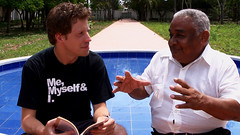If you thought the lost episode of “Fear Factor” that Gawker recently excerpted was Too Much Donkey Information, you may want to steer clear of this week’s installment of the New Filmmakers’ Fest at Anthology Film Archives. At 6 p.m., the program kicks off with “Donkey Love,” about men in northern Colombia who have sex with donkeys. (Seems those secret service agents didn’t see the half of it.) The film’s premise (and trailer, above) left us with more than a few questions. So we spoke with the film’s director, Daryl Stoneage, to find out – among other things – if he wasn’t just making it all up.
Is this real?
This is 100 percent real. Some days when I Google search my name or talk to my girlfriend’s parents, I wish it wasn’t, but it truly is.
So there are actually men who have sex and fall in love with donkeys?
There are not only men who have sex and fall in love with donkeys in the film but there are also midgets, polygamists, musicians who have written songs about it, an author who’s written a book about it, a father who introduces it to his son for the first time, a guy who has sex with three donkeys at the same time, a guy who’s cheating on his wife with a donkey and even a festival that celebrates it. Trust me, it’s like no film you’ve ever seen before.
How did you find out about it?
A friend e-mailed me an article as a joke about a donkey brothel in Colombia where men paid to have sex with donkeys. The article was in Spanish so I copied and pasted it into Google Translate. When I figured out what it was all about, I laughed my ass off and pitched it as an idea to my producer. The next thing I knew, we were hiring a Colombian researcher and booking plane tickets. We ended up tracking down an actual donkey brothel owner and that’s in the film as well.
Was it difficult to get the men to open up to you?
Colombians are more than happy to share this part of their culture. Since there’s no tourism in Colombia, foreigners don’t know about it, so we’re more than happy to be the ones to introduce this bizarre tradition to the rest of the world.
How was the process of interviewing these men?
We used a translator who ended up becoming one of the characters in the film. His friend was a priest and agreed to be drive us to all the interviews across Colombia. Slowly we starting getting the idea that a priest would be a great angle to have, so we start interviewing him and he also became a character in the film. It was really like the beginning of “Borat.” We landed in this small village in the middle of nowhere and all these great characters started emerging who had something crazy to add to the topic.
Have you gotten negative feedback from people who watch the film or, I don’t know, PETA?
We’ve gotten a little bit here and there but haven’t heard anything from PETA or any big organizations . . . yet. The thing you need to remind people when you tackle a topic like this is we’re just documentary filmmakers doing our job and because this is taboo in North America, doesn’t mean it’s taboo in Colombia. Our job is that of a journalist where we become flies on the wall and we just report what we see. We did our homework and although you see people engaging in the act throughout the film, we also interviewed an animal rights activist, a police officer, a lawyer, a doctor, a history professor, etc. It might be funny and we might be having a bit of fun with the topic, but, at the end of the day, it is a documentary.




